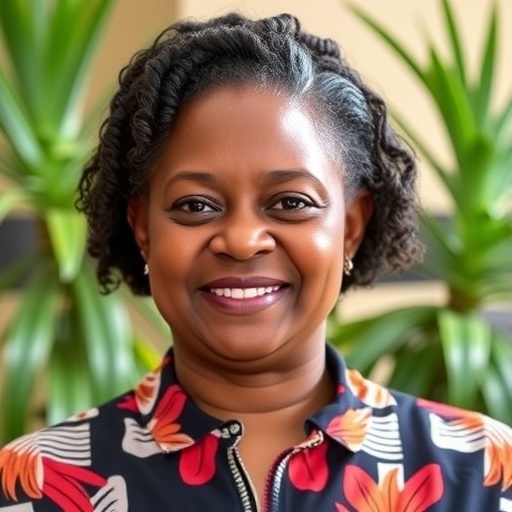On November 3, 2025, the Royal College of Surgeons in Ireland (RCSI) University of Medicine and Health Sciences honored Professor Agnes Binagwaho with the esteemed Cameron Award for Population Health, recognizing her extraordinary contributions to public health and the advancement of health equity across the globe. This award, which commemorates Sir Charles A. Cameron—a 19th-century pioneer in sanitation and public health reforms in Dublin—symbolizes a profound commitment to transformative health initiatives that extend beyond traditional clinical care to encompass systemic changes in healthcare delivery and population well-being.
Professor Binagwaho, a Rwandan pediatrician of remarkable stature, has dedicated her career to addressing disparities in access to healthcare, underscoring the importance of robust health systems particularly within low- and middle-income countries. She co-founded the University of Global Health Equity (UGHE) in 2015, an innovative institution stemming from Partners In Health’s vision to reimagine health professional education globally. This groundbreaking academic model emphasizes a multidisciplinary approach, integrating clinical excellence with social determinants of health to foster a new generation of healthcare leaders equipped to tackle health inequities worldwide.
Her journey is deeply intertwined with the history of Rwanda’s health transformation. After the 1994 Genocide against the Tutsi, Professor Binagwaho returned in 1996 to assist in the urgent reconstruction of the country’s devastated health infrastructure. Throughout her public service career, spanning from Executive Secretary of the National AIDS Control Commission to Minister of Health, she played a pivotal role in implementing policies that not only controlled infectious diseases like HIV/AIDS but also strengthened healthcare delivery systems at every level, enhancing resilience and equity.
Professor Binagwaho’s leadership extended into global platforms such as co-chairing the Millennium Development Goal Task Force on HIV/AIDS and Access to Essential Medicines, addressing one of the most pressing health challenges of the early 21st century. Her academic influence is further broadened through her appointments at UGHE, Harvard Medical School, and Dartmouth’s Geisel School of Medicine—institutions where she contributes to advancing health equity scholarship and fostering collaboration across diverse health systems.
Her governance roles in prominent organizations including the Rockefeller Foundation, African Europe Foundation, Cummings Foundation, and the African Union Commission for Infectious Diseases Response highlight her global engagement and strategic influence in shaping infectious disease policies and health initiatives. These roles enable her to advocate for equitable health solutions across continents, underscoring the interconnectedness of global health challenges and the need for coordinated responses.
With over 250 peer-reviewed publications to her name, Professor Binagwaho’s scholarly work offers evidence-based insights into strengthening healthcare delivery, particularly in resource-constrained environments. Her recognition by prestigious bodies, including membership in the U.S. National Academy of Medicine and fellowships in both the African Academy of Sciences and the World Academy of Sciences, attests to her standing in the international scientific community. Moreover, her accolades such as being named among the 100 Most Influential African Women and receiving the L’Oréal-UNESCO Award for Women in Science signify the profound impact she has made both scientifically and socially.
Her recent lecture at the RCSI award ceremony delved into the mechanics of “Health Equity and Improving Health Systems,” where she emphasized the indispensable role of community engagement in building trustworthy and resilient healthcare services. Drawing on Rwanda’s experience and broader Sub-Saharan African contexts, she articulated how effective health programs are rooted in authentic community involvement, overcoming mistrust, and demystifying health sciences. This approach aligns with contemporary understandings of health systems as complex adaptive systems requiring stakeholder buy-in and culturally tailored interventions.
The award presentation further illuminated RCSI’s ongoing commitment to advancing the United Nations’ Sustainable Development Goal 3, which aims to ensure healthy lives and promote well-being for all ages. RCSI’s School of Population Health continues to expand research that tackles diverse population health challenges ranging from non-communicable diseases like diabetes to environmental factors such as air pollution. This dedication to locally relevant yet globally applicable research strategies reflects the enduring legacy of Sir Charles A. Cameron, whose reforms laid the groundwork for integrated public health.
Professor Cathal Kelly, Vice Chancellor of RCSI, lauded Professor Binagwaho’s embodiment of the equity, compassion, and collaboration at the heart of the Cameron Award. He noted that her visionary leadership in reconstructing Rwanda’s health system and fostering health professional education serves as a compelling model for institutions worldwide committed to health equity. Such leadership is crucial in today’s global health landscape, marked by complex systemic inequities and emergent health threats requiring innovative, inclusive solutions.
RCSI itself remains a frontrunner in medical education and research with a focus on global health impact, as demonstrated by its top-ranking in the Times Higher Education University Impact Rankings 2025 for contributions to SDG 3. The institution’s international outlook is matched by initiatives such as a forthcoming public engagement center in Dublin, designed to bridge scientific discovery and public understanding. This space aims to catalyze health literacy and empower individuals with the knowledge to make informed health choices, reflecting RCSI’s philosophy of community partnership and knowledge dissemination.
In sum, Professor Agnes Binagwaho’s receipt of the Cameron Award underscores a life’s work devoted to systemic improvements in population health through health equity, education, and community-driven healthcare transformation. Her career narrative illustrates the power of integrating clinical expertise, policy leadership, and academic rigor with social justice imperatives, setting a benchmark for global health stewardship in the 21st century. Her example inspires continued efforts to forge resilient health systems that leave no one behind, echoing the foundational values exemplified by Sir Charles A. Cameron over 150 years ago.
Subject of Research: Health equity, health systems strengthening, and global health education in low- and middle-income countries.
Article Title: Professor Agnes Binagwaho Awarded the Cameron Award for Population Health by RCSI
News Publication Date: 3 November 2025
Web References: Not provided
References: Not provided
Image Credits: Not provided
Keywords: Health Equity, Global Health, Public Health Leadership, Health Systems Strengthening, Medical Education, Rwanda, Infectious Diseases, Community Engagement, Sustainable Development Goals, Population Health, Universal Health Coverage, Health Policy




